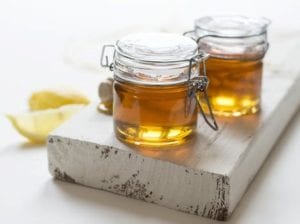Written by Jessica Patella, ND. Honey in combination with oral acyclovir was more effective than acyclovir alone in the treatment of children with primary herpetic gingivostomatitis.
 The most common herpes simplex viral infection is primary herpetic gingivostomatitis (PHGS), which later causes what is commonly known as cold sores 1,2. The most common side effect is pain that can affect food intake, hydration, sleep and well-being 1,3. The most commonly used treatment is an anti-viral medication, acyclovir 1. Recent research evaluated if the addition of honey would improve the healing of PHGS 1.
The most common herpes simplex viral infection is primary herpetic gingivostomatitis (PHGS), which later causes what is commonly known as cold sores 1,2. The most common side effect is pain that can affect food intake, hydration, sleep and well-being 1,3. The most commonly used treatment is an anti-viral medication, acyclovir 1. Recent research evaluated if the addition of honey would improve the healing of PHGS 1.
Honey has been shown to have antibacterial and anti-inflammatory properties 1,4. It has been recorded to have been used medicinally more than 5,000 years ago by the ancient Egyptians for inflammation in the eye and for burns on the skin 1,5. Modern medicine has started experimenting with its use as well, which is why it was considered for this study 1.
The research included 100 children from 2-8 years of age with a positive culture result for herpes simplex viral infection, along with clinical manifestations (fever, vesicles lesions, ulcerations) 1. The children were then randomized to either the acyclovir group plus placebo (n=50) or the acycylovir plus honey group (n=50). Both groups received acycylovir in a dose of 15mg/kg (5 times daily for 7 days) and a syrup to take 1 tsp every 4-hours (the placebo group had a sugar syrup, while the experimental group took honey). Parents were also allowed to give acetaminophen for pain to their children as needed.
Children were seen for a clinical evaluation on day 0, 3, 5 and 7. Oral lesions were classified by severity (0-10 lesions = mild, 11-20 lesions = moderate, 21+ lesions = severe 1. Pain as assessed through the visual analog scale.
After 7-days of treatment, the following results were observed:
- Children in the honey group had statistically significant improvement in the severity of their oral lesions compared to the control group at the 3rd, 5th and 7th days (p<0.001, p<0.001, p=0.003, respectively)
- At the end of treatment only 6 children in the honey group still had lesions, while 14 in the control group still had lesions (p=0.003).
- Children in the honey group had statistically significant improvement in the ability to eat and drink compared to the control group at the 3rd, 5th and 7th days (p=0.02, p=0.01, p=0.030, respectively)
- At the end of treatment only 5 children in the honey group still had difficulty eating and drinking, while 10 in the control group still had difficulty (p=0.03).
- Children in the honey group had statistically significant improvement in the severity of pain compared to the control group at the 3rd, 5th and 7th days (p<0.005, p<0.007, p=0.001, respectively)
- Children in the honey group had statistically significant less number of painkiller doses compared to the control group at the 3rd, 5th and 7th days (p<0.001, p<0.040, p<0.020, respectively)
PHGS is a contagious disease, especially in children in daycare-like settings 1,6. Treatment with acyclovir is to help decrease viral shedding and therefore transmission of the virus 1, but this was the first study to show that the addition of honey in children can help improve the symptoms and recovery 1.
The addition of honey to treatment of PHGS with the anti-viral medication acycylovir improved symptoms and outcomes in children, including decreased pain, resuming a normal diet and faster recovery compared to placebo 1. This was a preliminary study and future research with more participants needs to be conducted to confirm findings 1
Source: Awad, Osama G. Abdel-Naby, and Abdel-Monem H. Hamad. “Honey can help in herpes simplex gingivostomatitis in children: Prospective randomized double blind placebo controlled clinical trial.” American journal of otolaryngology 39, no. 6 (2018): 759-763.
© 2018 Elsevier Inc. All rights reserved.
Click here to read the full text study.
Posted March 9, 2020.
References:
- Awad OGA-N, Hamad A-MH. Honey can help in herpes simplex gingivostomatitis in children: Prospective randomized double blind placebo controlled clinical trial. American journal of otolaryngology. 2018;39(6):759-763.
- Amir J, Harel L, Smetana Z, Varsano I. The natural history of primary herpes simplex type 1 gingivostomatitis in children. Pediatric dermatology. 1999;16(4):259-263.
- Amir J, Harel L, Smetana Z, Varsano I. Treatment of herpes simplex gingivostomatitis with aciclovir in children: a randomised double blind placebo controlled study. Bmj. 1997;314(7097):1800.
- Hwang SH, Song JN, Jeong YM, Lee YJ, Kang JM. The efficacy of honey for ameliorating pain after tonsillectomy: a meta-analysis. European Archives of Oto-Rhino-Laryngology. 2016;273(4):811-818.
- Mansour AM, Zein W, Haddad R, Khoury J. Bullous keratopathy treated with honey. Acta Ophthalmologica Scandinavica. 2004;82(3p1):312-313.
- Hale BD, Rendtorff RC, Walker LC, Roberts AN. Epidemic herpetic stomatitis in an orphanage nursery. JAMA. 1963;183(13):1068-1072.

